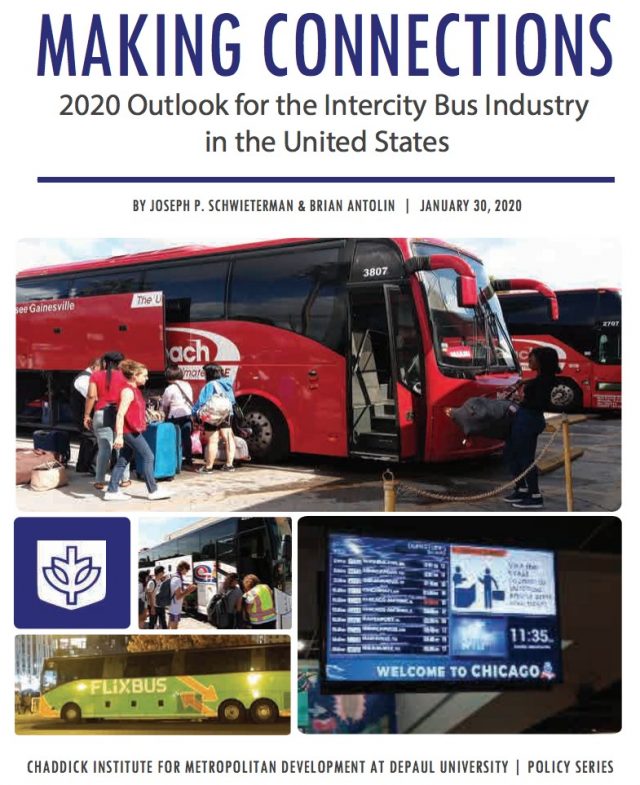 Intercity bus lines and booking platforms are rolling out the innovations to improve first- and last-mile travel options and provide more conveniences. Free taxi connections, new ridesharing partnerships, and better web-based search tools are giving the sector a more high-tech image.
Intercity bus lines and booking platforms are rolling out the innovations to improve first- and last-mile travel options and provide more conveniences. Free taxi connections, new ridesharing partnerships, and better web-based search tools are giving the sector a more high-tech image.
Tech-oriented enhancements and a bevy of new routes across the country are focal points of DePaul University’s nearly released analysis on the intercity bus industry. Making Connections: 2020 Outlook for the Intercity Bus Industry in the United States shows an industry in the midst of competitive and strategic adjustment.
The biggest stories of recent months include the expansion of Germany-based Flixbus, which is pushing the envelope on data-driven approaches to finding optimal locations for it bus stops as well as using airline-style dynamic pricing. Flixbus uses a hybrid approach that involves overlapping local, express, and intra-regional routes, melding point-to-point express service with more locally oriented runs. Its algorithms allow schedules to be adjusted great regularity (sometimes weekly) service patterns to vary dynamically in response to demand shifts. The carrier grew at an impressive pace last year, expanding from only a handful of states to 22 plus the District of Columbia.
Greyhound is using technology to optimize its seat inventory. In the past, the carrier has allowed open ticketing on certain routes, in which passengers can get on buses of their choice without a formal reservation. Following a change last year to its casino-oriented Atlantic City routes, however, the entire Greyhound-operated route network is 100% reservation based. In addition, at more than fifty of its stations, Greyhound rolled out new LCD arrival and departure monitors giving passengers an experience more closely resembling airports. Information on the monitors is also fed to its BusTracker app and website. Passengers previously often had to settle for static signs and PA announcements to find out where and when to board their bus.
Better last-/first-mile connections are also part of the mix. In July, Hampton Jitney in New York launched a program with Via rideshare in which customers, after making a reservation, receive a discount code for Via’s shared-ride shuttle service between Hampton’s Airport Connection bus stop and LaGuardia or John F. Kennedy airports. Customers can redeem the discount to or from the airport.
Salt Lake Express/St. George Express, which serves Idaho, Montana, Nevada, and Utah, stands out for its “Door-to-Door” program. Launched in 2011 and gradually improved, this allows for passengers in Logan and St. George, Utah, and Rexburg, Idaho to be picked up and dropped off anywhere in designated zip codes near these bus stops. Once a customer opts in and provides pick-up or drop-off address, a ride is arranged—a service reportedly used by about 10% of customers.
OurBus piloted free shared taxi rides to and from its Ithaca, New York stops. Customers who entered their desired address and luggage requirements during booking were grouped and assigned to specific taxis, with consumers being alerted about their ride through push notifications. More than 300 rides were reportedly handled in this way, and the program will be rolled out as a paid service in multiple cities in spring 2020.
Third-party booking platforms use schedule data to build complex itineraries and summarize travel options. Boston-based Wanderu has a full suite of Google Map features to help users plan their itinerary, including geo-locations that features gives those who enters specific addresses myriad options with varying transfer points, cost and travel time. Wanderu made headlines in autumn by signing a deal with Kayak.com that allows consumers to simultaneously evaluate air, bus, and train options. Busbud has several integrative features as well.
The Chaddick Institute is hosting a free hour-long webinar on Making Connections on Friday, February 14 from at noon CT (10 a.m. PT). To register for the webinar or reach the study team, email chaddick@depaul.edu.
